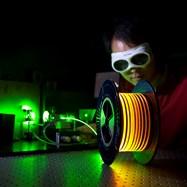Sustainability research – Energy
13 December 2021
From batteries to biofuels, breakthroughs in energy production and storage will be a critical part of the transition
How universities are addressing the challenge of developing cleaner, greener energy systems
Imperial College London - working with business to improve energy interfaces
Imperial College is working with Shell and Diamond Light Source to help energy systems transition to net-zero pollution by 2050. InFUSE will examine how technologies like batteries, electric vehicles, chemical production, and carbon capture and storage (CCS) can be improved by understanding interfaces in these systems, enhancing sustainability and enabling a transition to a green economy.
University of York – BioYorkshire for biobased innovation
Biobased innovation looks set to transform Yorkshire’s economy with a network of specialised business incubators, training, networking and entrepreneurial support. Using its established science base, the region will be able to produce chemicals, materials and fuels. The project will also support net-zero food production, farming and wider land use practices.
The University of Nottingham - developing low carbon energy storage
A new low-carbon energy storage system is being developed to supply cheap, on-demand heat for people living and working in the UK. The technology will help to decarbonise the buildings sector, while also addressing issues of fuel poverty and pollution. The researchers will also investigate social, economic, environmental barriers that prevent the uptake of community-based heat networks in the UK.
King’s College London – improving battery safety
Academics at the Department for Engineering at King’s College London are working towards creating safer, more efficient lithium-ion batteries, contributing to a greener and more sustainable future for us all. Collaborating with researchers across Newcastle University and Imperial College London, researchers are investigating the fire-risks with these newer and evermore prevalent batteries, and how to stop fires starting and spreading.
University of Glasgow – bringing hydrogen home
Hydrogen is a promising green energy alternative, and the University of Glasgow is carrying out ground-breaking research in how to use it for heating and household appliances.
University of Edinburgh – promoting sustainable biofuel
The University of Edinburgh’s is helping east Africa achieve a United Nations target of sustainable energy for all by 2030 by researching use of biofuels and how to make its production more efficient, ensuring people have better access to sustainable fuel.
-
Hamir Patel
hamir.patel@russellgroup.ac.uk
020 3816 1316
-
Ben Moore
020 3816 1303
 X
X


